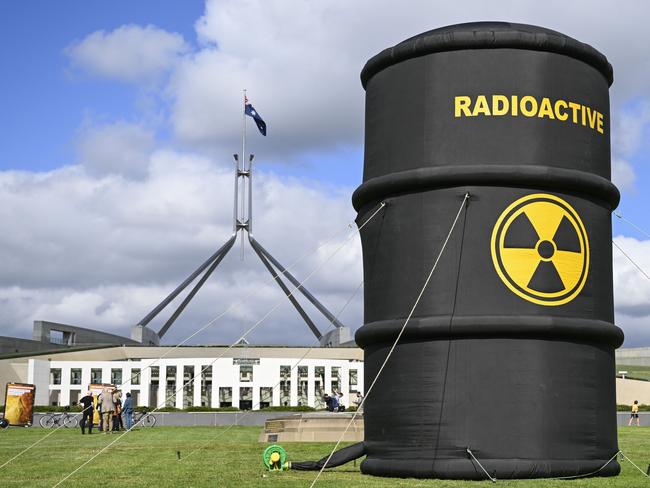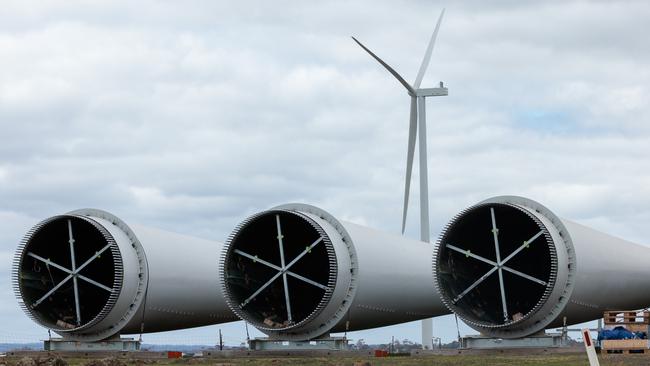Vikki Campion: Charities that should take on environment-destroying developers receiving money from developers
Charites who say they believe in environmental protection should fight to spare the wilderness from industrial sprawl, instead of sacrificing it to beef-up their financial statements, writes Vikki Campion.
News
Don't miss out on the headlines from News. Followed categories will be added to My News.
How is it fair that a nature photographer from a 150-member green-thumb group in Far North Queensland is left to battle billionaire developers in a landmark national case, while environmental charities with multimillion-dollar incomes are more interested in diesel-powered inflatable toys on the lawns of parliament?
Conservation groups that obtain millions in government grants and huge memberships have the resources to support Rainforest Reserves, which faced off against the barristers funded by the Australian Government and billionaire developer Twiggy Forrest, to halt 600ha of habitat destruction of 22 threatened species in court this week, but they’re not. Follow the money, and the silence makes sense.
In Canberra during budget last week, the Australian Conservation Foundation (ACF), with a $15.5m income, spent the day filling a diesel generator with a jerry can to keep their inflatable erect, to act as a prop for Senator Fatima Payman and Senator Lidia Thorpe to pose in front of. This activity would probably fall under a $3.3m “Community mobilising, media and engagement” expense account.
ACFs biggest donors, named in its annual report as “Nature’s Champions”, include intermittent power developer and private jet owner Mike Cannon-Brookes’s organisation “Boundless Earth”, as well as Matthias Krups, who funnelled $50,000 to Climate 200 MP Zali Steggall in two years; and Geoff Ainsworth and his wife, Johanna Featherstone’s, Orange and Sardines Foundation, with Ms Featherstone also donating $100,000 to GetUp for the Voice referendum.

Note the cute little crossover between our “conservation” charities and the interests pushing intermittent power projects like wind factories, which include the marketing arm for intermittent power in politics.
The charities that should be taking on the developers destroying the environment are instead receiving money from the developers.

Across Australia, 41,000 wind towers are proposed with a massive damage bill, not including millions of hectares to be bulldozed for solar and tens of thousands of kilometres required for new high-voltage transmission lines. This case could set a precedent forcing companies to engage with the communities they disrupt. So it’s no wonder Rainforest Reserves is all alone.
When your funding comes from billionaires with stakes in intermittent power, or governments pushing the same agenda, projects like wiping out animals for wind factories bring a care factor of zero.
The so-called environment charities, like the Wilderness Society with it’s $11.3m income, the $48.7m World Wildlife Fund or the various conservation councils, were nowhere to be seen in court this week supporting a group happier replanting rainforest on the edges of Lake Barrine then fronting the Federal Court.
They are receiving money from $121m intermittent power pusher, The Sunrise Project, which is big on the “privacy” of their donors, the same way they are big on transparency for everyone else; with the same donors appearing again – Boundless Earth, the Orange and Sardines Foundation, and a whole host of overseas-based companies, such as the New York Zegar Family Foundation, Washington-based Wallace Global Fund, and left-wing giant the Sequoia Foundation.

Annual reports show The Sunrise Project is funnelling coin from overseas into the Queensland Conservation Council, which received $759,521 last year while the Capricorn Conservation Council received $63,888. Then you have Groundswell, an offshoot of Sunrise, which in its 2024 report, gave $4.67m to “climate advocacy organisations”, including Farmers for Climate Action, the Hunter Jobs Alliance, Conservation Council of Western Australia, and even funding their own climate reporter at AAP.
The wind factory that Rainforest Reserves is fighting in the Upper Burdekin will knock out at least 600 hectares of habitat for koalas, Sharman’s rock-wallabies, greater gliders, red goshawks, masked owls, bats, and spectacled flying foxes; 22 threatened species in total.
Charites who say they believe in environmental protection should fight to spare the wilderness from industrial sprawl, instead of sacrificing it to beef-up their financial statements.
THE TAX WHICH ALLOWS BIKIES TO TRADE IN THEIR MERCEDES FOR A BENTLEY
When Health Minister Mark Butler proudly boasted of “a new generation of world-leading tobacco control legislation”, who could imagine a government so visionary that it would hand Australia’s tobacco control to international crime gangs?
Just when you would think there is not much more Mr Butler could do to help western Sydney bikies trade in their Mercedes for million-dollar Bentleys, new laws that came into action this week ban menthols.
Grandma’s favourite cancer stick is cancelled from legal retailers, while you can bum a black-market cherry-flavoured disco dart off any high-schooler convinced that the plant-based acoustic version of nicotine is “healthier”.

A government-created crime paradise means daylight ram-raids on convenience stores and small businesses literally set on fire is becoming a more regular occurrence, as city wastewater is thick with nicotine from people who now lie to the government about their addiction, the same way the government does about their addiction to cigarette excise.
People haven’t stopped smoking or vaping; they just stopped admitting to it, as every legal packet comes with a $55 minimum wallop to the wallet, and a heavy side of judgment, compared to a $15 under-the-counter pack, without the rotting body parts on the front. Is it any surprise that amid a cost of living crisis, Australians saved themselves $7bn in taxes supporting black market darts?
Now, the government is insisting on making gangs richer with illegal vapes too. It’s $20 for a Chinese-made illegal version, versus around $250 to get a government sanctioned vape set up, including a script, device, doctor’s appointment, pods and postage.
If you can pause indexation on beer, which both major parties have promised this campaign, even though we already have the third highest taxed beer in the world, you can pause or rewind the excise on tobacco. Otherwise, as the price of legal tobacco keeps soaring, watch as international drug cartels become the major suppliers of nicotine to Australia.
LIFTER
The Kooyong Liberal campaign for the “Monique, please do not take this sign!” poster, cashing in on the joke of the Climate-200 funded MP’s team which was caught on the run with an Amelia Hamer corflute last week.
LEANER
“Shadow MP for Bradfield”, teal Nicollette Boele, showing us the double standard in how a woman making a crude remark leading to being banned from a hairdresser is given excuses, compared to what would happen to a male politician under the same circumstances.
Do you have a story for The Telegraph? Message 0481 056 618 or email tips@dailytelegraph.com.au
More Coverage
Originally published as Vikki Campion: Charities that should take on environment-destroying developers receiving money from developers





